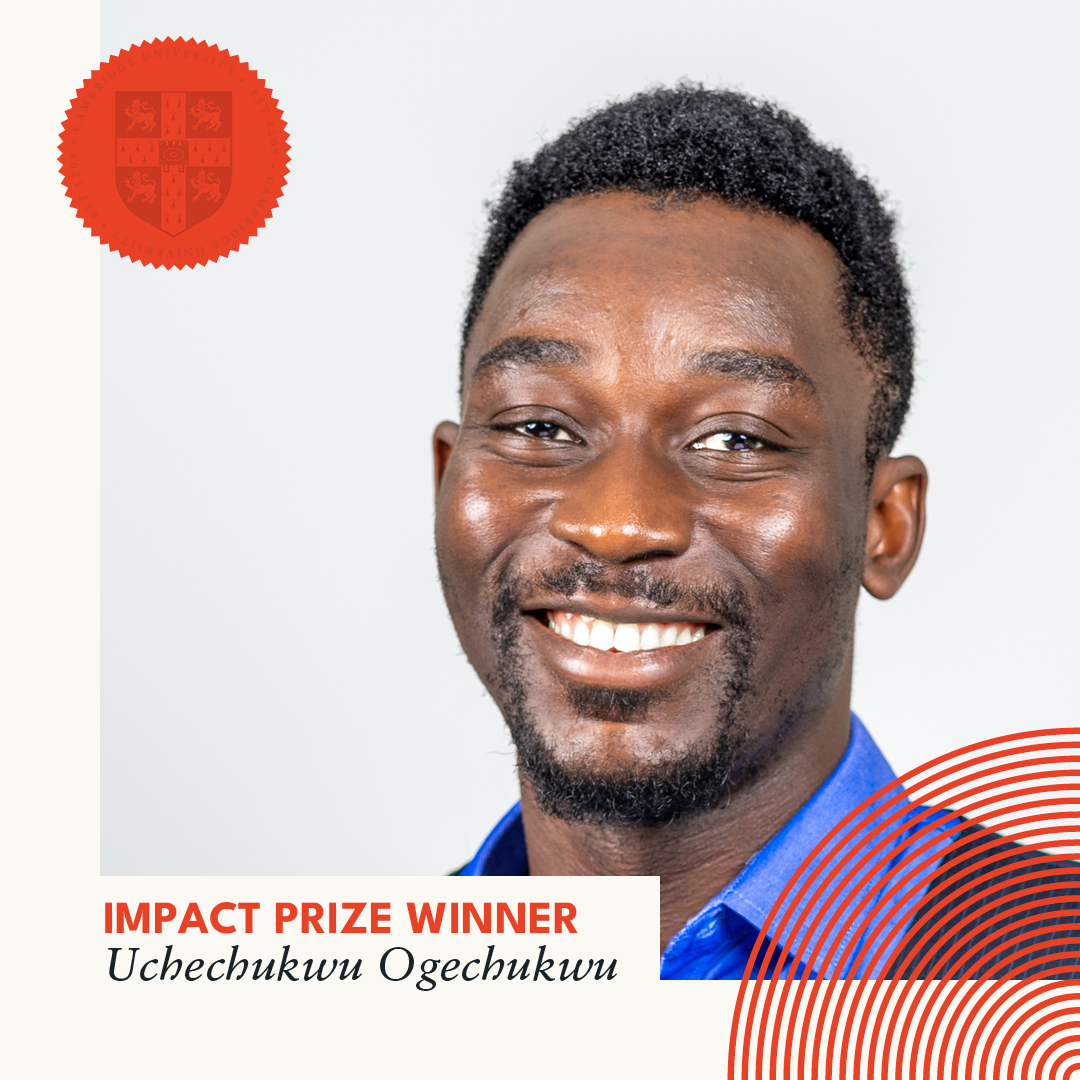
Impact Prize winner Uchechukwu Ogechukwu on his work to bring sustainable energy to Africa and to boost African enterprise
Our work in Nigeria is a testament to how a good team can drive change no matter where in the world they might be.
Uchechukwu Ogechukwu
Uchechukwu Ogechukwu [Uche for short] is a man on a mission. As an undergraduate he did a project on reducing waste at his father’s factory and found that most of it was caused by energy supply issues. While at the University, he co-founded a solar energy company with four other friends and has gained major funding.
Now he’s at the University of Cambridge to do his MPhil in Technology Policy to learn how to scale his business while also looking to help fellow African student entrepreneurs innovate and scale theirs.
Uche [2024] was born in Abakaliki, the capital city of Ebonyi State in southeastern Nigeria, but he grew up in Onitsha in Anambra State. He is the eldest son of a large family. His father runs a manufacturing and recycling factory and Uche and his siblings worked in the factory from an early age as is the norm for families in his area. At the age of nine, Uche could operate the film extrusion blowing machine, a piece of equipment that is used to produce polyethylene film, which is widely used in packaging, agriculture and industry.
At school Uche was good at learning and loved every subject, but particularly Maths, Physics, Geography and Economics. He says he could apply what he learned in Physics and Chemistry to life in the factory, for instance, his understanding of the importance of temperature, speed and tensile stress in the production of polythene film.
University
Uche studied Geography at the University of Nigeria, Nsukka, starting in 2014 and graduating in 2018. As part of the course, he did a 90-day study on waste management at his father’s factory and uncovered the challenges of an unstable or epileptic power supply in the business.
As it became clear that the epileptic power issue was a huge economic problem in Nigeria, Uche and friends from the university decided to set up a solar power company while in his third year at the University, with the goal of providing a more constant source of electricity.
Many people told Uche and his colleagues – Kingsley Okereke, Nnaemeka Udeeh, Aaron Esumeh and Godwin Nwangele – that their idea wouldn’t work and that if solar equipment broke down it would not be fixed. So they decided to design their own equipment that could be fixed by the local team. Their company Greenage Technologies Power Systems Ltd aims to harness renewable energy to combat energy poverty and environmental degradation in Africa.
Since its inception as a research and development group to the roll-out of its first products in 2018 and its evolution into a business-to-consumer firm, Green Technologies has moved quickly and attracted significant investment. Its first big investment of $100,000 came as a result of the Nigeria Off-Grid Energy Challenge in 2019. The Challenge was funded by Shell-funded impact investment company All On and the United States African Development Foundation. In 2022, All On announced a $500k investment to fund the construction and expansion of Greenage Technologies’ charge controllers and inverters manufacturing facility in Enugu State.
The company, whose main customers are schools, hospitals and small businesses, has significantly grown since then, putting solar energy solutions in the homes of thousands of people, hospitals and schools, saving millions of tonnes of carbon from the environment and bringing “the happiness of clean, constant, reliable electricity” to many.
It has continued to innovate and introduce new products, for instance, it launched a Powerwall system called the NewGen Ultra, a locally-made, all-in-one smart solar inverter system powered by lithium-ion battery technology, a system Uche believes will change the way solar installations are done in Nigerian homes.
Greenage Technologies is also part of the Energy Catalyst round-10 funding of about £1m to develop its Ubuntu energy system, a solution that it says will help to harness excess and wasted solar energy into community energy, democratising power sharing. “Our work in Nigeria is a testament to how a good team can drive change no matter where in the world they might be,” says Uche.
Over the last two years, Uche has also been putting his energy into supporting other entrepreneurs in Nigeria. He co-founded Hardware Garage, a centre for technology and hardware content promotion in Nigeria. It aims to give young people a place to innovate where they can get access to mentors and entrepreneurs. Already the centre has helped with funding and developing two start-ups – a company that provides mobile solar systems to rural communities and another which sells mobile conversion kits.
Both have scaled from the lab, raising pre-seed funds, winning global prizes including the Royal Academy of Engineering Africa Prize, the Economic Community of West African States’ Regional Off-Grid Electricity Access Project grant, the Westerwelle Foundation award and more.“We want to create an enabling environment where people can get support to innovate,” says Uche.
Cambridge
Uche is currently doing an MPhil in Technology Policy at the University of Cambridge, led by Professor Christos Genakos at the Judge Business School. He was accepted and began in September. He is wasting no time in getting to work to help other African entrepreneurs in Cambridge either. He feels universities could do more to support African founders and talks about the lack of opportunities for African-focused start-ups who do not speak the language of the developed countries, for instance, with regard to Artificial Intelligence.
As he is not one to sit and wait for opportunities, he has teamed up with fellow Gates Cambridge Scholar Kamiar Mohaddes to set up an African Founders webinar series through Kings E-Lab. He says: “The goal is to give African students in Cambridge access to entrepreneurs who have already built businesses and to ignite their passion.”
And he is not only focused on enterprise. Uche has also recently started a project with a friend to keep children in school in Nigeria. Through quiz and debate games, students get to win termly tuition fees to help them stay in school. Uche’s college Fitzwilliam is among the donors.
He is delighted to have won the Gates Cambridge Impact Prize. He states: ” I am passionate about sustainable development in Africa’s energy sector. For that reason, I co-founded Greenage Technologies to combat energy poverty. With a background in technology from the private sector, I’m eager to explore technology’s policy aspects and collaborate with the Gates Cambridge community to drive positive change.”












